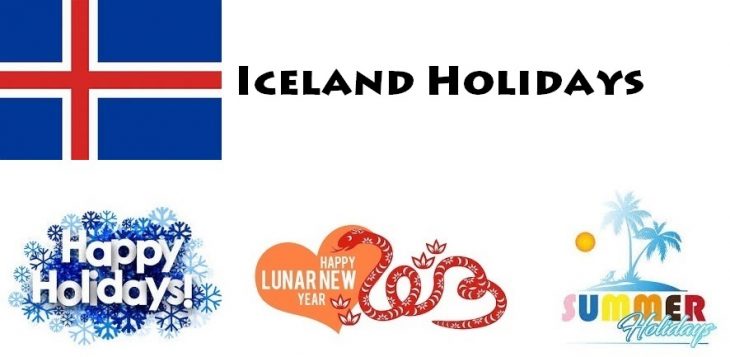Iceland Holidays
Iceland Public Holidays
Searching for the national holidays in Iceland? All public holidays in Iceland are treated like Sundays. This means that most of the Iceland employees have a day off and all schools are closed on these office holidays. If you are planning a trip to Iceland and want to know what the national and regional holidays are, check the details in the tables below.
List of Official Holidays in Iceland for Year 2020
| # | Date | Holiday | Day |
| 1 | January 01, 2020 | New Year’s Day | Wednesday |
| 2 | April 09, 2020 | Maundy Thursday | Thursday |
| 3 | April 10, 2020 | Good Friday | Friday |
| 4 | April 12, 2020 | Easter Sunday | Sunday |
| 5 | April 13, 2020 | Easter Monday | Monday |
| 6 | April 23, 2020 | First Day of Summer | Thursday |
| 7 | May 01, 2020 | Labour Day | Friday |
| 8 | May 10, 2020 | Mother’s Day | Sunday |
| 9 | May 21, 2020 | Ascension Day | Thursday |
| 10 | June 01, 2020 | Whit Monday | Monday |
| 11 | June 17, 2020 | Independence Day | Wednesday |
| 12 | August 03, 2020 | Commerce Day | Monday |
| 13 | November 08, 2020 | Father’s Day | Sunday |
| 14 | December 24, 2020 | Christmas Eve | Thursday |
| 15 | December 25, 2020 | Christmas Day | Friday |
| 16 | December 26, 2020 | St. Stephen’s Day | Saturday |
| 17 | December 31, 2020 | New Year’s Eve | Thursday |
List of Official Holidays in Iceland for Year 2021
| # | Date | Holiday | Day |
| 1 | January 01, 2021 | New Year’s Day | Friday |
| 2 | April 01, 2021 | Maundy Thursday | Thursday |
| 3 | April 02, 2021 | Good Friday | Friday |
| 4 | April 04, 2021 | Easter Sunday | Sunday |
| 5 | April 05, 2021 | Easter Monday | Monday |
| 6 | April 22, 2021 | First Day of Summer | Thursday |
| 7 | May 01, 2021 | Labour Day | Saturday |
| 8 | May 09, 2021 | Mother’s Day | Sunday |
| 9 | May 13, 2021 | Ascension Day | Thursday |
| 10 | May 24, 2021 | Whit Monday | Monday |
| 11 | June 17, 2021 | Independence Day | Thursday |
| 12 | August 02, 2021 | Commerce Day | Monday |
| 13 | November 14, 2021 | Father’s Day | Sunday |
| 14 | December 24, 2021 | Christmas Eve | Friday |
| 15 | December 25, 2021 | Christmas Day | Saturday |
| 16 | December 26, 2021 | St. Stephen’s Day | Sunday |
| 17 | December 31, 2021 | New Year’s Eve | Friday |















































